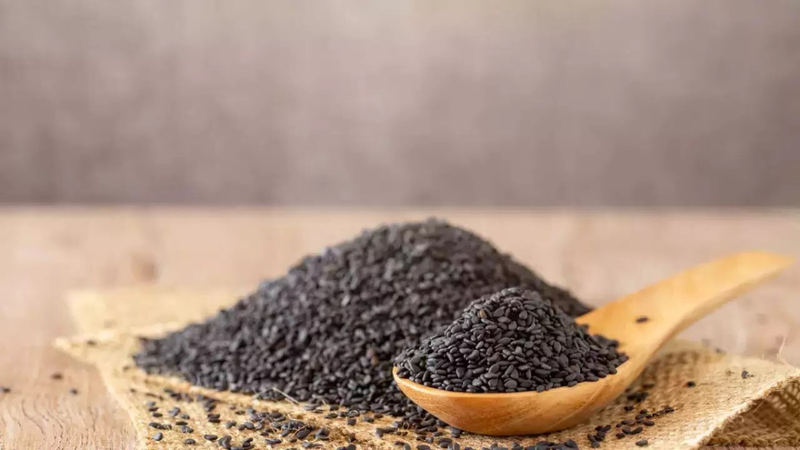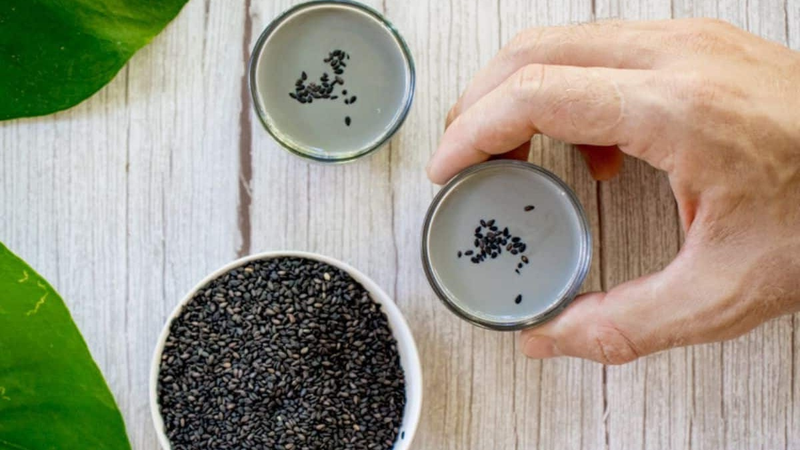Black sesame seeds are a familiar type of seed that is small in size but brings many benefits in supporting health and anti-aging. In particular, black sesame contains 8 times more calcium than milk and is considered a “golden food” that is good for bones.
Calcium content in black sesame seeds
Black sesame seeds (black sesame) contain outstanding calcium content, about 8 times higher than milk. In addition to calcium, black sesame is also a rich source of vitamin E and important trace elements such as iron, zinc and selenium. In particular, the iron content in black sesame is 3 times higher than spinach when used by the same weight, while the calcium content is second only to dried shrimp and superior to most other vegetables and beans.

Black sesame contains about 8 times more calcium than milk.
However, because black sesame contains a fairly high amount of oil, consuming too much can cause indigestion and is not good for health. According to the “Dietary Guidelines for Chinese Residents” in 2022, more than 300ml of milk should be consumed every day to ensure calcium needs. Although the calcium content in black sesame is very high, the actual amount of calcium absorbed by the body from black sesame is lower than that of milk.
Other health benefits of black sesame
In addition to calcium, black sesame seeds also contain many good nutrients that provide many other health benefits such as:
Support digestive system activities
Black sesame seeds contain a rich amount of fiber, with just 2 tablespoons meeting 8% of the daily fiber requirement. Fiber plays an important role in supporting digestion, because it is a component that is not digested or absorbed by the body, helping to increase food mass and absorb water, softening stools. Thanks to that, the process of excretion through the stomach and intestines is easier, reducing the risk of constipation.
In addition, the fiber in sesame seeds also helps reduce the symptoms of irritable bowel syndrome, hemorrhoids, appendicitis and many other digestive problems. In addition, adequate fiber consumption has been shown to reduce the risk of colon cancer.
Reduce the risk of atherosclerosis
Black sesame seeds are a source of easily absorbed complete protein, along with many types of unsaturated fatty acids that help regulate cholesterol levels. Thereby contributing to reducing blood clot formation and preventing platelet coagulation, helping to reduce the risk of atherosclerosis.
Not only that, the compound sesamin in black sesame acts as a powerful antioxidant, preventing lipid peroxidation, reducing free radical damage to cells, while effectively protecting the cardiovascular system.
Support for gallstone prevention and anti-oxidation
Black sesame seeds contain lecithin – a natural fat that can dissolve cholesterol in bile, preventing accumulation and crystallization to form gallstones. In addition, black sesame is also rich in vitamin K, a powerful antioxidant. This vitamin helps protect cells from damage caused by free radicals, slows down lipid oxidation, thereby limiting premature aging.

Black sesame seeds have the ability to help prevent gallstones and are antioxidants.
Thanks to this antioxidant ability, black sesame not only helps maintain the health of internal organs but also helps improve the elasticity and vitality of the skin, making the skin firmer and smoother.
Protect the liver and kidneys
Sesamin in black sesame has the effect of reducing the harmful effects of alcohol on the liver, improving liver function. At the same time, it helps enhance the ability to protect and maintain kidney function. In addition, when used topically, sesame oil also has the effect of clearing heat, detoxifying, anti-inflammatory and pain relief.
Prevent anemia
Black sesame seeds contain high iron content, which is an essential mineral for the production of hemoglobin and red blood cells. Hemoglobin plays an important role in transporting oxygen to the entire body. Iron deficiency can lead to reduced hemoglobin production and cause anemia. Adding black sesame to the diet in a reasonable way will help the body supplement the necessary amount of iron, thereby limiting the risk of anemia.
Some tips when eating black sesame
Black sesame seeds are a nutritious food, bringing many health benefits. However, to ensure safety and optimize effectiveness when using, you need to note a few things below:
Black sesame seeds should be ground before use to increase nutritional efficiency
Black sesame seeds contain many valuable nutrients such as natural vitamin E, essential amino acids and diverse fatty acids. However, these nutrients are often encased in the hard shell of the seed, making it difficult for the body to absorb directly. Therefore, roasting and grinding sesame seeds before eating will help release nutrients better, while increasing the body’s absorption capacity.
At the same time, roasted black sesame seeds also give off a characteristic aroma, increasing the attractiveness and deliciousness of dishes. Therefore, black sesame seeds are often processed in the form of puree, soup or thick dishes for easy digestion and maximum nutritional value.

Black sesame should be roasted and ground before use to increase flavor and nutritional value.
Do not overdose
Although rich in nutrients, black sesame seeds are high in fat and difficult to digest if eaten too much. Therefore, the recommended amount of black sesame seeds should only fluctuate between 10 – 15 grams per day to avoid putting pressure on the digestive system and ensure overall health.
In short, black sesame seeds are an excellent source of nutrition with many health benefits, especially calcium, vitamin E and important minerals. Although black sesame seeds can supplement some calcium for the body, they cannot completely replace other sources of calcium such as milk. To maximize the benefits of black sesame seeds, incorporate them into a varied and moderate diet, ensuring adequate nutrition for the body.





